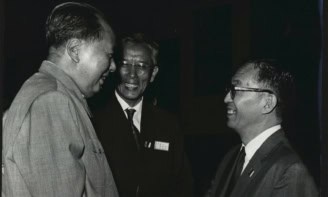Einstein's views on God are more complex than some of his most famous quotations might suggest. Alan H Batten looks at what the great physicist really thought about religion

“Stop telling God what to do!” When Niels Bohr said these words to Albert Einstein – if indeed he ever did – it was probably in exasperation with Einstein’s frequent repetition of the phrase “He does not play dice with the universe”. The latter is perhaps the most famous of Einstein’s many references to religion, although “The Lord God is subtle, but malicious he is not” comes a close second. There are many others too (see box below).
Scientific materialists, who regard all forms of religious belief as superstition, are often puzzled and even embarrassed by Einstein’s frequent remarks about God. But conventional religious believers – knowing that Einstein was a Jew – often jump to the conclusion that he was referring to the traditional Judaeo-Christian God, and invoke his authority in support of their own beliefs.
I suspect that both groups have misunderstood Einstein and that we should all read more carefully what he wrote about science and religion. In 1940, for example, he submitted a paper to a conference on this subject in which he clearly stated that, in his view, there could be no “legitimate conflict between science and religion”. The main source of conflict between the two, he argued, lay in the concept of “a personal God”.
As the physicist Max Jammer describes in his 1999 book Einstein and Religion, that remark created a furore at the time. Many people in the US assumed that by denying the existence of a personal God, Einstein was denying any kind of God. What we now call the “religious right” was then vocal in its criticisms (and probably would be today).
However, Einstein’s use of the word “God” was idiosyncratic. Indeed, Banesh Hoffmann – his biographer and former colleague – wrote that we do not know precisely what Einstein meant by the word. Perhaps, however, we can explore some of the things he did not mean.
Religious experience
As has been well documented, Einstein was born into a secularized Jewish family that did not observe any traditional rites. Nevertheless, stimulated by religious instruction from other relatives and at school, the young Einstein had an intensely religious phase that lasted for about a year. It came to what he later called an “abrupt end” at the age of 12, when he concluded that many Bible stories were incredible. At the same time, he discovered Euclidean geometry, which he then thought offered a level of certainty that no religion could.
After that early experience, Einstein never again took part in any formal religious observances – Jewish or Christian – except, perhaps, to attend the weddings or funerals of friends and relatives as a matter of courtesy. Looking back on his brief religious foray, Einstein wrote in his 1949 Autobiographical Notes that it was quite clear “that the religious paradise of youth…was a first attempt to free myself from the chains of the ‘merely personal’, from an existence dominated by wishes, hopes, and primitive feelings”.
Einstein felt that the insights into the universe given by science and mathematics were a greater and surer release from the “merely personal” than religion. He was awestruck by our ability to comprehend the universe, at least in part, and in later life remarked several times that the most incomprehensible thing about the universe is that it is comprehensible. This kind of awe, he believed, was essential for scientists and, indeed, for human beings.
“The most beautiful experience we can have is the mysterious,” he wrote in a 1931 essay. “A knowledge of the existence of something we cannot penetrate, our perceptions of the profoundest reason and the most radiant beauty, which only in their most primitive forms are accessible to our minds – it is this knowledge and this emotion that constitute true religiosity; in this sense, and in this alone, I am a deeply religious man.” This remark shows that Einstein defined religiosity in his own terms. Indeed, in the essay he goes on to distance himself from orthodox Jewish and Christian religion, expressing his disbelief in the idea that an individual can survive after their body dies or in any kind of final judgement. He was instead satisfied with the “devoted striving to comprehend a portion, be it ever so tiny, of the Reason that manifests itself in nature”.
Pantheism and the personal God
Einstein’s conviction that nature is rational is closely linked to his conception of God: he could not believe that God played dice with the universe, because that would be irrational. He accepted what he believed to be the corollary, namely that human beings have no free will. Einstein’s other favourite saying – that the Lord is subtle but not malicious – is related to the same conviction of rationality. “Nature”, he concluded, “hides her secret because of her essential loftiness, but not by means of ruse.”
For those who regard all forms of religious belief as superstition, it would be attractive to conclude that Einstein simply meant “nature” whenever he used the word “God”. Indeed, identifying God with nature is known as pantheism, a belief that is generally attributed to the unorthodox Jewish philosopher Baruch Spinoza (1632-1677). We know that Einstein admired Spinoza greatly and, although he did not share all of his religious views, it would seem plausible to label Einstein a pantheist.
However, in 1929 – during a rare interview with a journalist – Einstein was directly asked if he believed in the God of Spinoza. “I can’t answer with a simple yes or no,” he replied. “I am not an atheist [and] I do not know if I can define myself as a pantheist.” Indeed, pantheists view God and the universe as co-eternal and believe that there was no act of creation, whereas Einstein does seem to have regarded the universe as a creation.
But why did Einstein not believe in a personal God? To answer that question, we have to understand what he meant by the term. I would define a personal God as a God with whom human beings can have a relationship, analogous to those they have with one another. Although this idea might seem to indicate that God has a human form, I think it is perfectly possible to believe in a personal God who is not anthropomorphic. I suspect – but cannot clearly demonstrate – that Einstein sometimes confused the two ideas.
For example, while Einstein certainly did not like anthropomorphism, he still used personal terms, such as subtlety and malice, when speaking about God. Indeed, in his 1929 interview, the best simile he could think of for God was as the author of a whole library of books! Einstein would probably have defended himself by pointing to the limitations of human language, which make it almost impossible to avoid personal terminology completely.
But it is surprising that Einstein used such personal terms when talking about God, given that he saw his lifelong devotion to science as an attempt to transcend the “merely personal” in his own life; this suggests that he thought a personal God would be a limited God. Whatever he meant by “personal God”, Einstein remained consistent in his opposition to the idea until the very end of his life.
Cosmic religion
Although Einstein was not always consistent in what he said about God, there is a consistent theme running through his thoughts on religion – a theme that he called “cosmic religion”. He used this term to reflect the awe he felt when confronted with the universe and our ability to begin, at least, to comprehend it. Writing in 1930, he saw hints of this cosmic religion in the Psalms and the Hebrew prophets, and more clearly in Buddhism. This cosmic religion, he wrote, “knows no dogma and no God conceived in man’s image; so that there can be no church whose central teachings are based on it”.
Einstein’s dislike of organized religion is clear. Many people today, according to opinion polls, have similar ideas. They profess to believe in the spiritual – or even in God – yet rarely or never enter a church, mosque or synagogue. However, Einstein should not be regarded as their precursor. Their “new-age spirituality” is often anti-scientific, whereas Einstein’s cosmic religion was based firmly on a profound understanding of the physical universe, and of its underlying mathematical structure.
Einstein also often referred to his feelings of mystery and awe. The mystery, it seems to me, had three elements. Why is there anything at all? Why is the universe rational and ordered? And how can we, with our limited human minds, understand and appreciate at least something of that ordered rationality? I believe he used the word “God” as a shorthand for all this because he could think of none better.
Einstein’s condemnation of anthropomorphic images of God is at one with the most profound insights of all religions. He knew very well that the second commandment (which Jews and Muslims have kept more strictly than Christians) says we should not make any graven image and bow down and worship it. On that theme, Einstein agrees with the Hebrew prophets, whom he saw as forerunners of his cosmic religion.
Whether or not he meant more than their denunciations of idols when he denied belief in a personal God, I do not know. However, Einstein’s cosmic religion differs both from orthodox monotheism and from scientific materialism because of his conviction that science and religion must work together to explore the mysteries that fascinated him. That, surely, is the meaning of another of his famous sayings: “Science without religion is lame, religion without science is blind.”
Box: Einstein on God and religion
- [Quantum] theory yields much, but it hardly brings us close to the Old One’s secrets. I, in any case, am convinced He does not play dice. (1926, in a letter to Max Born)
- I cannot conceive of a God who rewards and punishes his creatures, or has a will of the kind we experience in ourselves. Neither can I nor would I want to conceive of an individual who survives his physical death…. (1930, from an essay)
- We see a universe marvellously arranged and obeying certain laws, but only dimly understand those laws. Our limited minds cannot grasp the mysterious force that moves the constellations. (1929, part of his reply to the question: “Do you believe in the God of Spinoza?”)
- What I am really interested in is whether God could have created the world in a different way; in other words, whether the requirement of logical simplicity admits a margin of freedom. (Mid-1940s, remark reported by Ernst Gabor Straus, then Einstein’s assistant)
- Then I would feel sorry for the good Lord. The theory is correct anyway. (1919, reply to his assistant, Ilse Rosenthal-Schneider, who asked what he would have done had Eddington’s eclipse measurements not supported general relativity)
- Science without religion is lame, religion without science is blind. (1941, from an essay)



